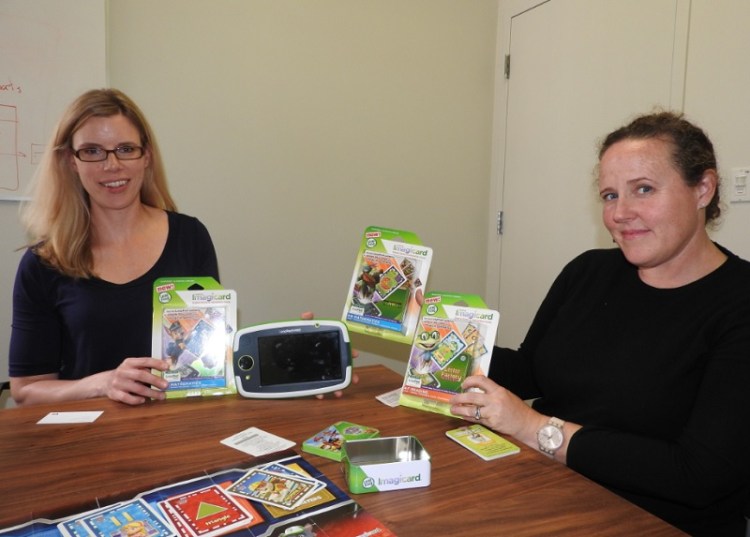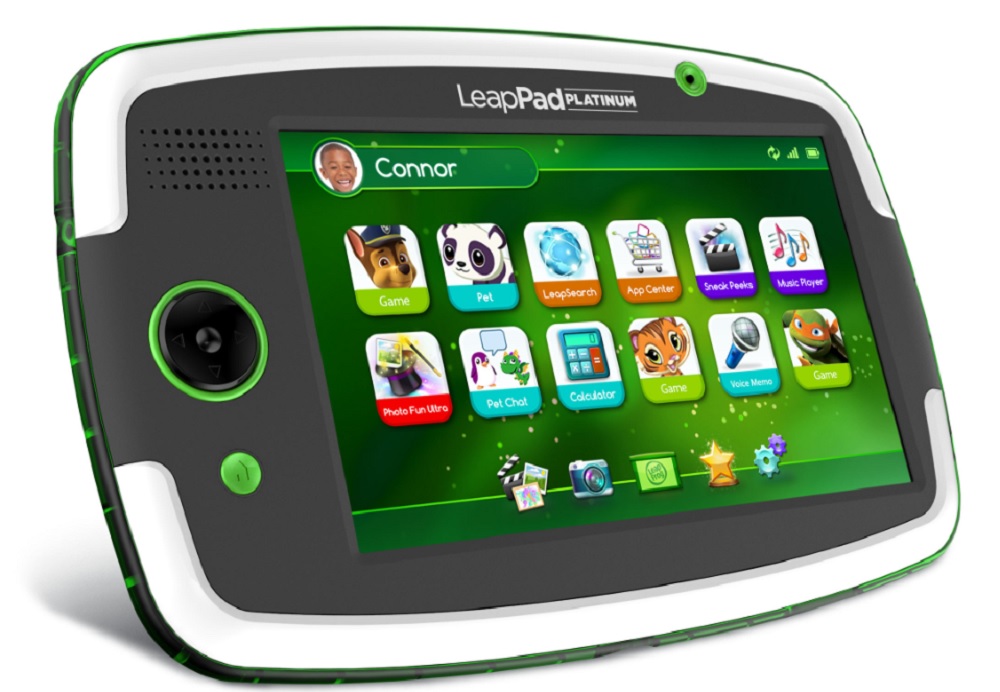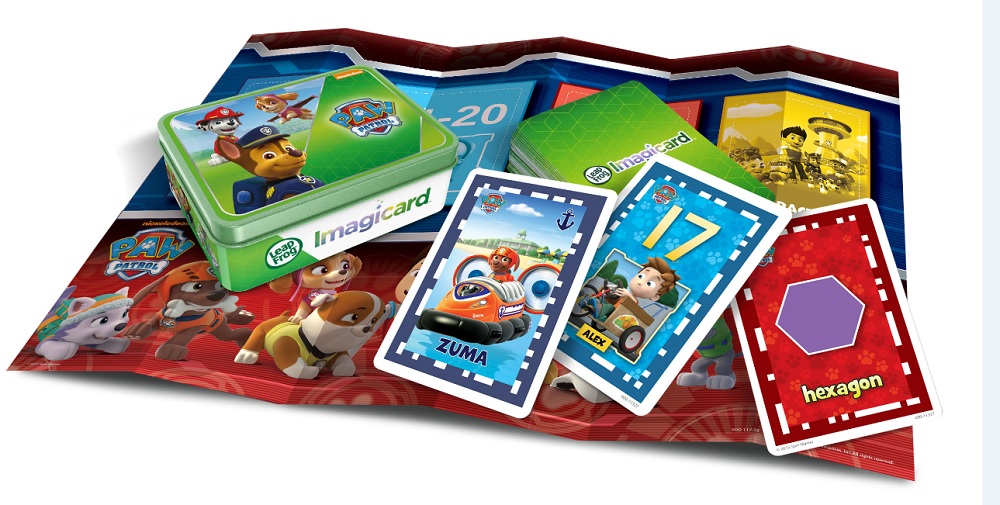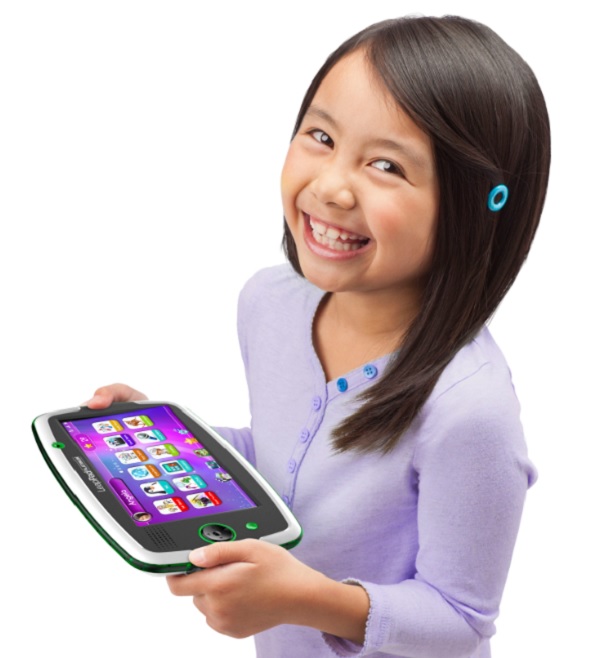LeapFrog Enterprises is unveiling its newest kids educational platform today: a physical card set that works with a new learning tablet.
The cards are part of the same combination of physical goods and digital games — dubbed “toys to life” — a $4 billion market that is marrying video games and toys. But in this case, LeapFrog has chosen to design a product that combines its 7-inch LeapPad Platinum tablet with physical cards — or Imagicards — to bring physical objects to life. The products coming this fall are part of Emeryville, Calif.-based LeapFrog’s lineup of offerings for young children ages 3 to 8.
LeapFrog Imagicard consists of a paper mat and sets of cards that have identifying marks on them. When you use the new tablet or older LeapFrog devices to take a picture of the card, the picture triggers an animation on the screen. A character pops out of the image of the card and comes to life as a 3D animation. The character then launches into a lesson based on the particular game that they’re playing. This unlocks further lessons.
Jodie Sherman LeVos, director of learning at LeapFrog, and senior brand manager Paula Larsen Moore showed me how it worked. Even I had no trouble with it, so kids in the 3-5 range should have no problem activating the cards, which are a kind of “augmented reality” experience.
“We wanted to take a step back and innovate on our content,” Sherman LeVos said. “One of the big trends was this mashup of digital and physical, with toys like Skylanders. We wanted to harness that play experience and marry that with education.”
Larsen Moore said the team has been investigating what to do in the “toys to life” market for the past couple of years. Activision launched this segment with its Skylanders toy-game hybrid products. But that market is getting crowded, and testing showed that kids and parents alike really gravitated to the magic of interactive playing cards.
Each card pack sells for $25. You get 33 physical cards with all sorts of lessons. Once the child takes a picture of the card, they can extend the physical play into the digital realm. The cards come in branded tin containers and a mat that you can use as a kind of playing board, where you can place the cards. The device stores the cards in digital form, in case you lose one or leave it (or the entire set) at home.
To make the best use of the cards, LeapFrog created a powerful tablet, which has a 7-inch, multitouch capacitive screen that’s hard to shatter. It also has a 1-gigahertz processor, 8GB of memory, or enough to hold 40,000 photos or 100 game apps. It comes with two cameras and video recorders. It also has 10 apps, 10 songs, and a wireless Internet connection. Parents can create their own accounts to supervise the use of the tablet. The screen has a high-resolution display, but it isn’t quite high-definition.
The tablet keeps a permanent memory of a child’s progress in a game, and it adapts the difficulty to suit the child’s own rate of learning. That feature is called LeapFrog Just For Me learning.
The available games now include Paw Patrol, Teenage Mutant Ninja Turtles, and LeapFrog’s Letter Factory. In Paw Patrol, your job is a ecological mission to save Adventure Bay. You join Ryder to lend help to the cause. You solve math problems to earn Good Citizen badges. It has six playable puppies. You can patrol the bay for citizens who need help. The game teaches number recognition, counting, shapes, patterns, addition, and subtraction.
After much study, LeapFrog decided to skip doing a toy-game hybrid for now.
“We looked at toys extensively,” said Sherman LeVos. “Cards added the ability to extend learning beyond the game, off the screen. Cards really allowed us to teach and assess in ways we never have been able to before. Parents were quick to see that cards were a way to play together or to play without technology.”
Larsen Moore said in an interview that the glass on the tablet is rugged, as it is designed to hold together even if the screen shatters.
The kid-proof durable tablet will be available in the summer for $130. LeapFrog has more than 1,000 games that can run on the tablet.
Last year, LeapFrog also launched its LeapTV video game console for children with an educational twist — games approved by those who teach kids. The LeapTV costs $150 and has a lot of content, all aimed at kids 3 to 8.
For almost 20 years, the Emeryville, Calif.-based LeapFrog has specialized in creating educational games for kids on its own platforms such as the LeapPad that combine fun and education.
VentureBeat's mission is to be a digital town square for technical decision-makers to gain knowledge about transformative enterprise technology and transact. Learn More





